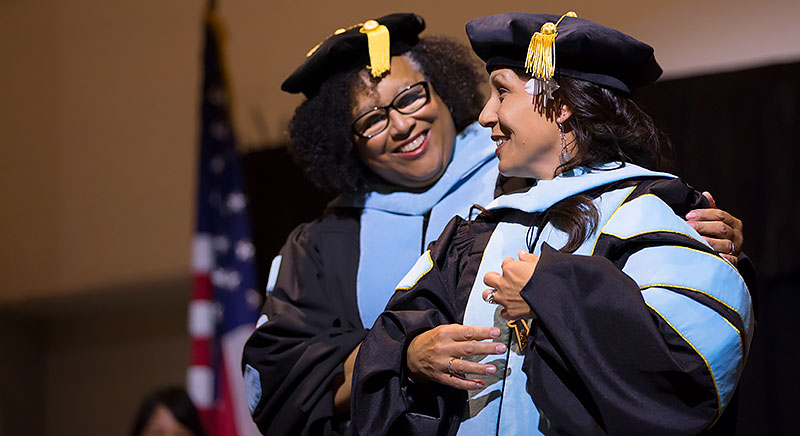
Andi Fejeran Sims aspires to be a “maga’håga” in higher education. The term means a strong female leader among the Chamorro people of Guam, the island of her ancestors.
Sims’ family settled in the United States from the U.S. territory after the Vietnam War. For nearly 20 years, she has worked in higher education, including 15 years in various student affairs positions at Cal State Fullerton. She wondered why there are so few Pacific Islander women in leadership roles at universities and colleges.
As a student in CSUF’s doctor of education in educational leadership (Ed.D.)-community college specialization, the Class of 2018 graduate set out on her own journey to find out why, and more importantly, the challenges and contributions of Pacific Islander women in higher education leadership positions.
Her dissertation focuses on “Maga’hagas: The Journey to Fulfill a Legacy of Leadership for Pacific Islander Women in Higher Education.” Sims is the 200th Ed.D. student to defend her dissertation, which she is finalizing for publication. She will complete the doctoral program in August. Her dissertation chair is Dawn R. Person, professor of educational leadership, who “pushed, motivated and believed in me.”
What is the significance of maga’håga?
The Chamorro people of Guam believe that no decision is made without the consent of a strong woman leader, the maga’håga, who is known to hold the best interest of the taotao (people), and the tåno (land) in her heart and mind. The maga’håga is the highest-ranking daughter of a chief, and for my study, it is used symbolically to represent the high-level indigenous Pacific Islander female leaders in higher education today.
Why did this topic interest you?
I have always wondered where the rest of my indigenous Pacific Islander sisters were, and why I did not see more women like me in higher education or in leadership roles. I often felt alone. Growing up, I always knew these women to be strong decision makers who looked out for the welfare of others, and who were committed to serving their community.
How does your cultural background tie into your study?
This is a core component of leadership in my perspective. When you know who you are and what your lineage is, you are linked to the long line of ancestors before you. I am from Guåhan of the Clan Concepcion, Carabao of the Village Piti. My family on my father’s side were farmers, and on my mother’s side, I am Tagalog, from Manila, Philippines. The ways of knowing, being and learning come from my Chamorro cultural upbringing. My body of research ties in cultural significance and indigenous Pacific Islander values into the validation of leadership beliefs, skills and abilities.
What is your research goal?
My main research goal is to amplify the voices of natural leaders and reinforce the power of their cultural ancestry. It’s about exploring the leadership capacity and aspirations of indigenous Pacific Islander women who have chosen a career path in higher education. For my research methodology I chose to use storytelling, an indigenous art form of passing down knowledge, where individual experiences are amplified into a collective voice about the significance of culture in shaping a leader and a leader’s aspirations. The inspiration is rooted in indigenous Pacific cultural beliefs, specifically in regards to the unique and significant role of women in ensuring a community’s success and survival.
How can your research help others?
This research is important because it illuminates the innate leadership qualities of indigenous Pacific Islander women, the wealth of leadership capacity they bring to the table, and the hope they will empower the younger generation of my sisters to know that they are not alone. This study also affords higher educational leaders, institutions and professional associations, deep insights of the innate leadership capacities of indigenous Pacific Islander women, their natural ability to be culturally competent leaders, and their profound commitment to advancing the success of the youth and their communities, which ultimately translates into retention and success of both leaders and students.